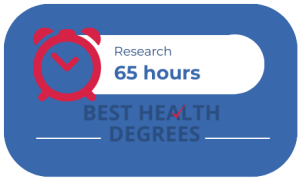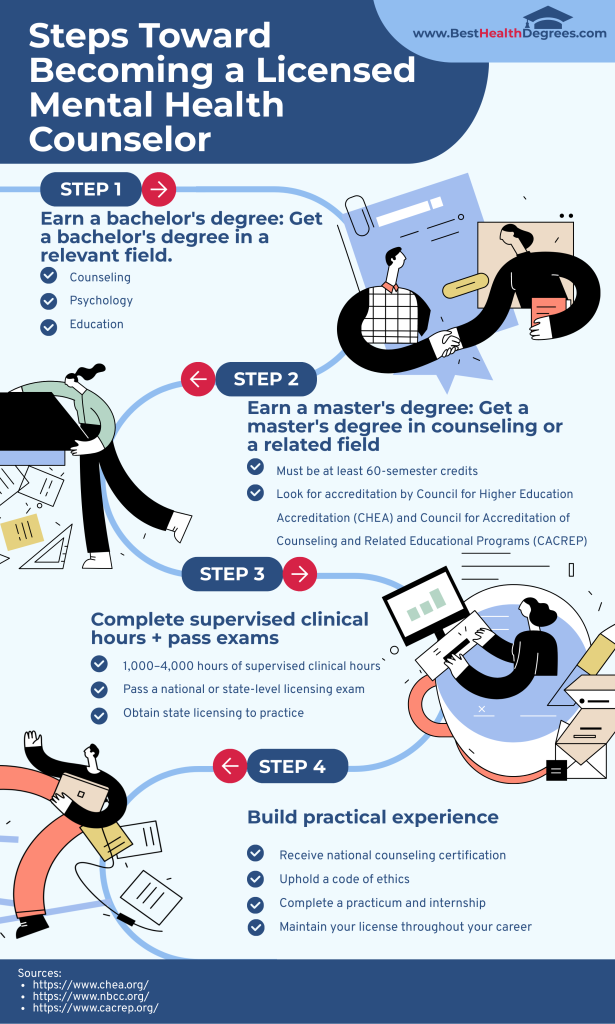
If you want to help others combat their mental illnesses and diseases, become a mental health counselor. According to the Bureau of Labor Statistics (BLS), this occupation will grow 18% over the next decade. This is a faster rate than average and will add more than 77,000 new jobs.
Many of those working in this field earned a bachelor’s degree in counseling or psychology before going to graduate school. But you’ll want to look at all the other requirements associated with working in this field.
The question of how society should address mental health issues is a difficult one. Fortunately, the answers to this ongoing query have begun to evolve across time and culture. We are adapting to newly identified understandings of the human condition thanks to advancements in medicine, chemistry, and psychology.
According to the National Alliance on Mental Health, mental health issues impact millions each year. More specifically, the startling facts regarding mental health in the United States include –
- 1 out of 5 adults in the U.S. will experience mental illness annually. In addition, 1 in 20 American adults will experience serious mental illness during the same period.
- Suicide is the second-leading cause of death for individuals aged 10 to 14.
- 50% of all mental illness that lasts a lifetime begins by age 14
- 75% of those dealing with lifelong mental illness will find the condition manifested by age 24.
Treating mental health, like the condition itself, is complex. As such, several professional routes are available to those who wish to become a licensed mental health counselor. You can pursue a rewarding career helping others resolve personal conflicts, relationships, and other life challenges.
What Degree is Best for Mental Health Counseling?
If you are considering becoming a licensed counselor, you should learn which of the various professional pathways will best meet your career goals and professional/personal interests. You’ll also need to know the specific professional licensing requirements for the area where you plan to practice.
Each of the degree options listed below has the potential to lead to a rewarding and professional career in mental health counseling. However, each professional route has unique emphases, varying philosophical bases. And, often, licensing requirements that differ among locations for those who want to become a licensed counselor. When considering the available academic degrees for a career in mental health counseling, these are the most common options.
A Degree in Counseling
A master’s degree in counseling is a common route for those aspiring to become a licensed mental health counselor. Programs with counseling roots often provide a strong foundation in counseling theories and effective practice techniques for a variety of clinical environments.
The specifics of the graduate counseling degree program can vary and depend on the university’s approach and the specific type of counseling degree being offered. For example, this may include –
- Clinical Mental Health Counseling
- School Counseling
- Marriage Counseling
- Family Therapy Counseling
Graduates of a master’s counseling degree program may be eligible for a professional license as Licensed Professional Counselors (LPC) or a similar designation. However, the specifics of licensing are state/jurisdiction dependent.
A Degree in Psychology
A master’s or doctorate degree in psychology is another professional path that provides the tools, skills, and education needed to become a licensed counselor. A graduate psychology program offers degree candidates an educational opportunity to complete coursework in assessment, psychotherapy, psychopathology, and more.
However, the specific degree program structure is likely to vary as the school has the option of creating focus areas such as:
- Counseling Psychology.
- Clinical Psychology.
- Industrial-Organizational Psychology.
- Experimental Psychology
Psychologists may have the opportunity to become licensed; however, those with a serious interest in learning how to become a licensed mental health counselor by earning a psychology degree should –
- Confirm specific requirements that vary by state/jurisdiction.
- Carefully review the psychology program requirements, the faculty involved, and available resources to make sure this program aligns with academic and career goals.
A Degree in Human Services
A human services graduate degree typically offers a broad understanding of social issues/community services. These have a direct impact on meeting basic human needs. So, while a human services degree program may not directly focus on counseling per se, the reality is that some people with human services degrees find rewarding counseling roles. You may work in supportive capacities across a diverse number of mental health settings, like:
- Social Services Agencies
- Non-Profit Organizations
- Government Agencies
- Community-Based Organizations
Take the time to explore whether the selected program will help provide the tools and education you need to meet you career goals.
A Degree in Social Work
A graduate degree in social work – i.e., a Master’s of Social Work (MSW) – is a common path for those becoming a licensed counselor. Master of Social Work degree programs tend to focus on developing the skills/knowledge and required ethical foundations for working in diverse settings with varying populations.
A social worker is a specialized mental health counselor who typically emphasizes a holistic approach and is trained in various clinical settings. This leads to licensure as an LCSW – a Licensed Clinical Social Worker in many states/jurisdictions.
The Stages of Counseling Education
As a Counseling Undergrad
It’s important that you have a deep understanding of mental illnesses, which you can get in a solid undergraduate program. Though most professional counselors majored in psychology, you may earn a degree in social work, sociology or another of the social sciences. To gain more experience, talk with your adviser about doing an internship. You might work in a counseling center, a homeless shelter or a hospital. Graduate schools look for well rounded applicants who have high grades and some additional experience. Even if you don’t do an internship, you might volunteer at local centers.
As a Counseling Grad Student
You cannot become a mental health counselor unless you have a master’s degree first. The school you attend should have accreditation from the Council for Accreditation of Counseling & Related Educational Programs. You can select a program that emphasizes marriage and family counseling or mental health counseling. The courses you take show you how to work with people from different backgrounds, how to get your clients to open up to you and how to identify issues that might relate to the emotional health problems, including drug addiction or abuse at home. Most programs will require that you do some fieldwork too.
After Your Graduate Program
Even after finishing your master’s degree, you still aren’t ready to work as a counselor. You will need to go through some additional training towards the end of your studies or after completing your studies. Some colleges refer to this as an internship, but other universities call this a residency program. You usually spend a minimum of 1,500 to 2,000 hours working in a supervised setting. While you’ll work with real clients, you’ll work under the guidance of a licensed therapist. Most programs require that you spend an additional 1,500 hours or more working independently with your clients.
So, as you can see, the best degree, if you wish to become a mental health counselor, is hugely dependent on your specific life and career goals.
Other Important Considerations
In addition to considering specific career objectives, degree candidates should also consider how the following impacts their ultimate decision –
- Accreditation – The school or specific program should be accredited by the relevant accrediting organization. For example, many counseling programs will receive CACREP accreditation, ensuring the program delivers the education and training as promised.
- Licensing Exams – Depending on your mental health career path, there are a number of licensing exams available. Examples include the ASWB Clinical Exams for social workers or the NCE/National Counselor Exam for mental health counselors.
- Clinical Experience Opportunities – Your career objectives will dictate the type and amount of clinical experience or internship options – which is critical to experiencing hands-on mental health counseling skills.
How Do I Choose a Mental Health Counseling Specialization?
Choosing a mental health counseling specialization is an important part of your career decision because this choice must align with your interests, values, and passions. It allows you to focus on specific populations, issues, or approaches/techniques within the broader mental health field.
Ask yourself –
- What type of counseling aligns with my skills and abilities?
- Which of my experiences in the field of mental health do I find most compelling?
- What populations or issues resonate with me?
- What are my long-term career goals?
From there, an aspiring mental health counselor should:
- Seek supervised experience or program internships in various practice areas to gain exposure.
- Connect with mentors or seasoned counselors for guidance.
- Consider the licensing requirements for your chosen specialization, as some may have additional requirements.
Explore the various specializations –
- Clinical Mental Health Counseling.
- School Counseling.
- Grief Counseling.
- Career Counseling.
- Couples/Family Counseling.
- Trauma Counseling.
- Child/Adolescent Counseling.
- Addictions Counseling.
Remember, mental health specialization choices don’t necessarily have to be permanent. In fact, many mental health counseling careers evolve as professionals gain experience and seek to explore related mental health fields.
What is the Difference Between Counseling and Therapy?
The terms counseling and therapy are often utilized interchangeably. In certain contexts, they refer to similar mental health services provided by professionals with appropriate training. Both counseling and therapy can take place in various settings, including private practices, community mental health centers, hospitals, schools, and online platforms.
The choice between “counselor” and “therapist” for professional titles varies by jurisdiction, with certain areas allowing the terms to be used interchangeably, while others have set forth rules distinguishing the designations.
The subtle distinctions between counseling and therapy are not standardized regionally or globally, and cultural differences can significantly impact the term’s usage. In some places, there may be no significant difference between the two. The subtle differences depend on the term’s usage, professional preference, and region of use.
First, many consider counseling a short-term, solution-based intervention that addresses an individual or group’s specific issues or challenges. Counseling is often seen as a shorter, more focused intervention that deals with situational challenges. Counseling often offers practical advice, guidance, and support for issues and concerns considered immediate.
On the other hand, therapy is often perceived to be a more comprehensive professional process involving deep analysis/exploration of emotions, behavioral patterns, and long-term issues that disrupt one’s peace of mind or ability to reach one’s defined goals. Therapy usually implies a longer, more in-depth process addressing longstanding and complicated issues.
In practice, clients may not be aware of or even concerned with the distinctions between counseling and therapy. In fact, they might consistently use the terms interchangeably and seek services based on their needs and preferences, having no idea a distinction between the terms may exist.
How Do I Get Licensed as a Mental Health Counselor?
To become a mental health counselor, you also need to meet all the requirements in your state for getting a license. You usually need to show that you completed an extensive residency program or internship and pass a background test. Most states require that you go to the police department, submit your fingerprints and wait for the results. Your record should be free of any felonies. You will also take a professional counseling examination and submit your test scores to your state, which will keep the results on file. Some states also ask that applicants agree to continue their education and pursue a PhD.
Related Resource: Master of Public Health
Mental health counselors provide assistance to patients diagnosed with depression, anxiety disorders and other mental or emotional conditions. Before you can become a mental health counselor, you must complete your undergraduate studies, earn an advanced degree, go through a residency program and obtain a license to practice in your state.
Becoming licensed as a mental health counselor typically involves the following requirements, which generally are set forth by the relevant licensing board in the state or country where you plan to practice.
The specific steps to becoming licensed as a mental health counselor can vary, but the following offers a general outline of the process for becoming a licensed mental health counselor –
Earn a Relevant Degree
As I mentioned, many types of graduate-level degrees can lead to a career as a mental health counselor. Remember to confirm that the program you select is accredited by a recognized accrediting body that specializes in counseling degree programs.
Complete Required Program Coursework – Fulfill the program’s requirements, which generally includes coursework in:
- Counseling Theories.
- Ethics.
- Assessment.
- Research and more.
- Accumulate Supervised Practicum or Internship Experiences
Most licensing boards mandate a certain number of hours of supervised clinical work while earning your degree as well as postgraduate. It is noted that the required supervision must be provided by a licensed/qualified mental health professional with a supervisory capacity.
Fulfill Additional Licensing Requirements
Check the licensing requirements in the state or country where you plan to practice. The licensing board may require a criminal background check, professional references, or the completion of specific training programs.
- Pass the Licensing Exam
Study for and pass the licensing exam for which you choose to sit. The specific exam requirements can vary by jurisdiction, but common tests for licensure include –
- The National Counselor Examination (NCE).
- The Examination for Professional Practice in Psychology (EPPP).
- The National Clinical Mental Health Counseling Examination (NCMHCE).
Maintain Continuing Education
Once licensed, most professionals who hold licensure must meet established continuing education requirements to maintain/renew their license. This usually involves completing a certain number of continuing education hours each renewal period; however, most continuing education can be conveniently completed online.
Adhere to Ethical/Legal Standards
Practice within the ethical and legal criteria set forth by the relevant profession and licensing board. This includes staying abreast about regulation changes, maintaining client confidentiality, and always obtaining informed consent, etc.
Stay Informed/Up-to-Date and Engage in Professional Development Opportunities
Stay informed about developments in the field and engage in ongoing professional development by attending related conferences, training programs/workshops to help network and improve your skills.
Advanced Paths for Mental Health Specialists
As noted above, specific mental health counselor licensure requirements can vary significantly by jurisdiction/state. To ensure you understand the requirements for career advancement, check with the licensing board in the state or country where you intend to practice.
Although optional, it is important to understand how to advance your mental health counseling career as it evolves and grows over time –
Specialize or Pursue Advanced Certification.
Consider pursuing additional certifications or specializations within the field. While these are not required for licensure, they can enhance your expertise as a mental health professional and marketability as a professional in specific areas.
Seek Supervision for Areas of Specialization.
If you plan to specialize in a particular area, seek additional supervision or training in that specialization. Some states may require additional supervision for specific practice areas.
Additionally, consider seeking guidance from a mentor or advisor familiar with the licensure process in your specific location.
Related:
5 Important Mental Health Jobs

